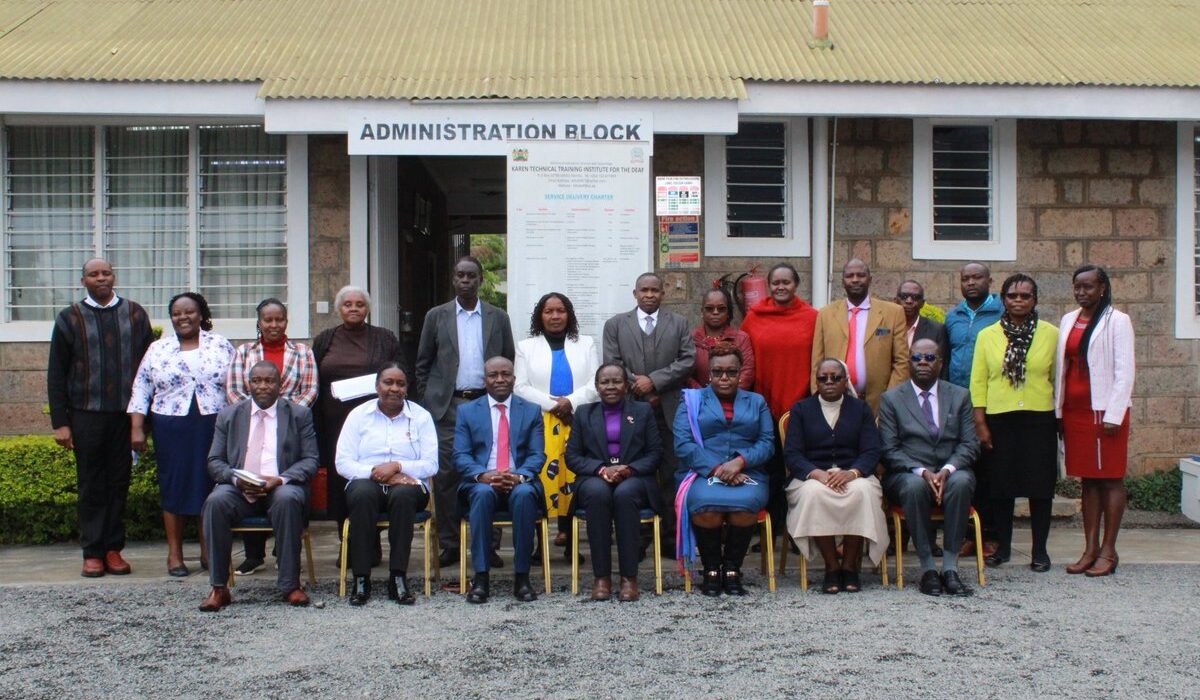Karen Technical Training Institute for the Deaf (KTTID), located in Nairobi County, Kenya, is a premier public tertiary institution under the Ministry of Education, dedicated to empowering deaf youth through technical and vocational education and training (TVET). Established in 1990, KTTID has become a beacon of inclusivity, offering a wide range of artisan, craft, and diploma courses tailored to meet the needs of deaf students while also welcoming hearing individuals. This article provides a detailed overview of the courses offered at KTTID for the 2025/2026 academic cycle, including program details, entry requirements, and application processes, optimized for readers seeking career-focused education in Kenya.
Why Choose Karen Technical Training Institute for the Deaf?
KTTID stands out as a center of excellence in TVET, with a mission to provide technical and vocational training using modern technology. Its vision is to be a leading institution in integrated technical education, particularly for individuals with hearing impairments. Here’s why KTTID is a top choice:
- Inclusivity: Prioritizes deaf students but welcomes hearing applicants, fostering an inclusive learning environment.
- Flexible Entry Requirements: Offers programs with accessible entry criteria, accommodating various academic backgrounds.
- Government Support: Registered and accredited by the Technical and Vocational Education and Training Authority (TVETA), with opportunities for Higher Education Loans Board (HELB) funding.
- Practical Training: Emphasizes hands-on skills in high-demand fields, ensuring graduates are job-ready.
- Kenya Sign Language (KSL) Integration: Provides training in KSL, enhancing communication skills for all students.
This guide explores the full list of programs available for the 2025/2026 cycle, as sourced from the Kenya Universities and Colleges Central Placement Service (KUCCPS) and other reliable platforms, ensuring comprehensive and up-to-date information.
Courses Offered at KTTID for 2025/2026
KTTID offers a diverse array of programs at various levels, including Level 3, Level 4, Level 5, and Level 6, under the Competency-Based Education and Training (CBET) framework and accredited by the Kenya National Examinations Council (KNEC) and the National Industrial Training Authority (NITA). Below is the complete list of courses for the 2025/2026 academic cycle, categorized by field of study for easy reference.
1. Building and Construction Technology
KTTID provides practical training in construction-related fields, equipping students with skills for Kenya’s growing infrastructure sector.
- Building Technology Level 6 (Diploma)
- Prepares students to manage construction projects, focusing on modern building techniques.
- Entry Requirement: KCSE C- or relevant craft certificate.
- Ideal for aspiring site supervisors or construction managers.
- Building Technician Level 5 (Craft Certificate)
- Focuses on practical skills in construction, including blueprint reading and site management.
- Entry Requirement: KCSE D (plain) or artisan certificate.
- Carpentry and Joinery Level 5 (Craft Certificate)
- Trains students in woodworking, furniture making, and joinery techniques.
- Entry Requirement: KCSE D (plain) or relevant artisan certificate.
- Carpentry and Joinery Level 4 (Artisan Certificate)
- Entry-level course for beginners in carpentry, focusing on basic woodworking skills.
- Entry Requirement: KCPE certificate or any KCSE grade.
- Masonry Level 4 (Artisan Certificate)
- Covers bricklaying, stonework, and concrete construction.
- Entry Requirement: KCPE certificate or any KCSE grade.
2. Electrical and Electronics Engineering
These programs cater to the demand for skilled electrical technicians in Kenya’s energy and manufacturing sectors.
- Electrical Engineering (Power Option) Level 6 (Diploma)
- Advanced training in power systems, electrical installations, and maintenance.
- Entry Requirement: KCSE C- or relevant craft certificate.
- Electrical Installation (Power) Level 5 (Craft Certificate, TVET-CDACC)
- Focuses on electrical wiring, installations, and safety standards.
- Entry Requirement: KCSE D (plain) or artisan certificate.
- Electrical Operation (Power Option) Level 5 (Craft Certificate)
- Covers operational aspects of power systems and equipment maintenance.
- Entry Requirement: KCSE D (plain) or artisan certificate.
- Electrical Installation Level 4 (Artisan Certificate, CBET)
- Entry-level training in basic electrical installations.
- Entry Requirement: KCPE certificate or any KCSE grade.
3. Information and Communication Technology (ICT)
KTTID offers ICT courses to prepare students for Kenya’s digital economy.
- ICT Technician Level 6 (Diploma)
- Covers software development, networking, and IT support.
- Entry Requirement: KCSE C- or relevant craft certificate.
- ICT Technician Level 5 (Craft Certificate)
- Focuses on foundational IT skills, including computer repair and network setup.
- Entry Requirement: KCSE D (plain) or artisan certificate.
4. Hospitality and Culinary Arts
These programs train students for careers in Kenya’s thriving hospitality industry.
- Food and Beverage Production (Culinary Arts) Level 6 (Diploma)
- Advanced training in culinary arts, menu planning, and kitchen management.
- Entry Requirement: KCSE C- or relevant craft certificate.
- Food and Beverage Sales and Service Management Level 6 (Diploma, CBET)
- Focuses on restaurant management, customer service, and sales.
- Entry Requirement: KCSE C- or relevant craft certificate.
- Food and Beverage Sales and Service Management Level 5 (Craft Certificate)
- Covers service techniques and hospitality operations.
- Entry Requirement: KCSE D (plain) or artisan certificate.
- Culinary Arts Level 5 (Craft Certificate)
- Practical training in food preparation and presentation.
- Entry Requirement: KCSE D (plain) or artisan certificate.
- Food and Beverage Production (Culinary Arts) Level 4 (Artisan Certificate)
- Entry-level course in basic cooking and kitchen operations.
- Entry Requirement: KCPE certificate or any KCSE grade.
5. Business and Management
These programs prepare students for administrative and managerial roles.
- Business Management Level 5 (Craft Certificate)
- Covers business operations, marketing, and management principles.
- Entry Requirement: KCSE D (plain) or artisan certificate.
- Human Resource Management Level 6 (Diploma)
- Focuses on recruitment, employee relations, and HR policies.
- Entry Requirement: KCSE C- or relevant craft certificate.
- Human Resource Management Level 5 (Craft Certificate)
- Entry-level HR training for administrative roles.
- Entry Requirement: KCSE D (plain) or artisan certificate.
- Supply Chain Management Level 6 (Diploma)
- Trains students in logistics, procurement, and supply chain operations.
- Entry Requirement: KCSE C- or relevant craft certificate.
- Supply Chain Management Level 5 (Craft Certificate)
- Focuses on foundational skills in supply chain logistics.
- Entry Requirement: KCSE D (plain) or artisan certificate.
6. Social Work and Community Development
These programs equip students to support vulnerable communities.
- Social Work and Community Development Level 6 (Diploma)
- Covers social work practices, community outreach, and development strategies.
- Entry Requirement: KCSE C- or relevant craft certificate.
- Social Work and Community Development Level 5 (Craft Certificate)
- Entry-level training in community engagement and social services.
- Entry Requirement: KCSE D (plain) or artisan certificate.
7. Fashion Design and Beauty Therapy
These courses cater to Kenya’s growing fashion and beauty industries.
- Fashion Design Level 5 (Craft Certificate)
- Focuses on garment design, pattern making, and sewing techniques.
- Entry Requirement: KCSE D (plain) or artisan certificate.
- Fashion Design and Garment Making Level 4 (Artisan Certificate)
- Entry-level training in basic garment construction.
- Entry Requirement: KCPE certificate or any KCSE grade.
- Hairdressing and Beauty Therapy Level 5 (Craft Certificate, CDACC)
- Covers hair styling, makeup, and salon management.
- Entry Requirement: KCSE D (plain) or artisan certificate.
- Hairdressing Level 3 (Artisan Certificate)
- Basic training in hairdressing techniques.
- Entry Requirement: KCPE certificate or any KCSE grade.
- Artisan in Hairdressing and Beauty Therapy Level 4 (CDACC)
- Entry-level course combining hairdressing and beauty therapy skills.
- Entry Requirement: KCPE certificate or any KCSE grade.
8. Automotive and Welding
These programs focus on technical skills for the automotive and manufacturing sectors.
- Automotive Engineering Level 5 (Craft Certificate)
- Covers vehicle repair, diagnostics, and maintenance.
- Entry Requirement: KCSE D (plain) or artisan certificate.
- Manual Arc Welding Level 4 (Artisan Certificate)
- Trains students in welding techniques for industrial applications.
- Entry Requirement: KCPE certificate or any KCSE grade.
9. Kenya Sign Language (KSL)
- Kenya Sign Language (Short Course)
- Enhances communication skills for deaf and hearing students.
- Entry Requirement: Open to all applicants.
- Duration: 3 months (part-time).
Entry Requirements and Application Process
KTTID’s flexible entry requirements make technical education accessible to a wide range of students. Below is a summary of the general requirements:
- Diploma Courses (Level 6): KCSE mean grade of C- or a relevant craft certificate.
- Craft Certificates (Level 5): KCSE mean grade of D (plain) or a relevant artisan certificate.
- Artisan Certificates (Level 4): KCPE certificate or any KCSE grade.
- Short Courses: Open to all, with no specific academic requirements.
How to Apply
To enroll at KTTID, students must apply through the KUCCPS Student Portal (www.kuccps.ac.ke) during the designated application window. Alternatively, direct applications can be made by:
- Downloading Application Forms: Available on the KTTID website (kttideaf.ac.ke).
- Submitting Applications: Send completed forms with a non-refundable Ksh. 300 application fee (via money order) to P.O. Box 24785-00502, Nairobi.
- Contacting Admissions: Reach out via phone (+254 722 677859) or email (info@kttideaf.ac.ke) for assistance.
Note: Persons with hearing impairments are prioritized, but hearing applicants are encouraged to apply. Training in KSL is an added advantage.
Fees and Funding Options
The cost for diploma and certificate courses at KTTID is approximately Ksh. 67,189 per academic year, excluding external examination fees and admission costs for new students. Students can access:
- HELB Loans and Bursaries: Available for diploma and certificate students in public TVET institutions.
- Government Sponsorships: Apply through KUCCPS for potential fee subsidies.
For detailed fee structures, contact the KTTID admissions office.
KCSE Cutoff Scores (2022–2024)
As per the KUCCPS data for 2025/2026, specific KCSE cutoff scores for KTTID programs are not listed for 2022, 2023, or 2024, indicating flexible entry criteria based on the minimum requirements outlined above. This aligns with KTTID’s mission to accommodate students with varying academic backgrounds, particularly deaf youth who may face educational barriers.
Career Prospects and Industry Relevance
KTTID’s programs are designed to meet Kenya’s labor market demands, with graduates finding opportunities in:
- Construction: Site supervisors, carpenters, masons.
- Electrical Engineering: Technicians, installers, and maintenance workers.
- ICT: IT support specialists, network administrators.
- Hospitality: Chefs, restaurant managers, service staff.
- Business: HR officers, supply chain coordinators, business administrators.
- Social Work: Community development officers, social workers.
- Fashion and Beauty: Salon owners, fashion designers, stylists.
- Automotive: Mechanics, welders.
The institute’s emphasis on practical training ensures graduates are equipped with skills for immediate employment or entrepreneurship.
Why KTTID Stands Out
- Specialized Support: Offers tailored support for deaf students, including KSL training.
- Accreditation: Programs are accredited by KNEC, NITA, and TVETA, ensuring quality.
- Flexible Scheduling: Part-time classes (12:00–2:00 PM and 4:00–6:00 PM, including Saturdays) accommodate working students.
- Modern Facilities: Located on Karen Road, Nairobi, with state-of-the-art workshops and labs.
Karen Technical Training Institute for the Deaf is a cornerstone of inclusive technical education in Kenya, offering a wide range of programs for the 2025/2026 academic cycle. From building technology to culinary arts, its courses cater to diverse career paths, with flexible entry requirements and government-backed funding options. Whether you’re a deaf student seeking specialized training or a hearing individual looking for quality TVET education, KTTID provides a pathway to success. Apply today through the KUCCPS portal or contact the institute directly to start your journey toward a rewarding career.
For more information, visit kttideaf.ac.ke or call +254 722 677859.





